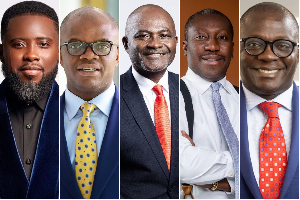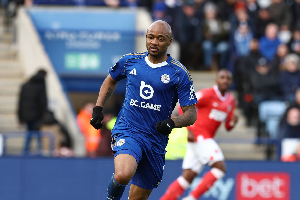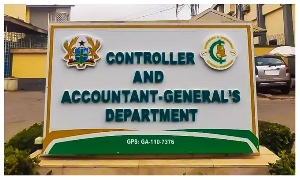On October 9th, 1997, The Independent Newspaper printed an article titled ?I can only Run for a Political Office Under a United Nkrumaist Party.? It is the earliest documented political interview of Dr. Paa Kwesi Nduom, one in which he described his journey from being a Young Pioneer in the 1960?s to a future Presidential candidate for the CPP. In the context of recent attacks from organizations such as the ?Sons and Daughters of the CPP? alleging a lack of faithfulness to the Nkrumaist ideology (among other things), this article is particularly telling ? it is the first of many pieces of evidence that Dr. Nduom?s beliefs, convictions, and message to the public has not changed since he entered the political arena.
There are three main points that will be made in this article: Firstly, as mentioned above, Dr. Nduom has had a consistent message regarding his political beliefs and the need for positive change within the ranks of the Nkrumaist parties. Secondly, Dr. Nduom?s hard work for his party has been undeniable and can be supported with clearly documented facts. The final and (arguably) most important thesis of this article is the willingness to form alliances and collaborate with other political parties is not something new for the CPP; those whose rationale for opposing Dr. Nduom is based on so-called ?skirt and blouse? voting would do well to study the history of the party they claim allegiance to. In the October 1997 article, Dr. Nduom clearly stated ?the only political party that I am interested in joining is a united Nkrumaist party? and that ?in this country you cannot run for any political office successfully without the backing of a strong political party.? While these words were printed 10 years ago, Dr. Nduom?s actions and words to date have clearly reflected that these are still among his core principles.
In the years leading up to the 2000 elections, there was much talk of a unification of the PCP, PNC, CP, and NCP. Many tipped Dr. Nduom as the most likely candidate for the Nkrumaists, but he quickly determined that his time had not come. He called a press conference on the 17th of November, 1999 and declared, in the presence of Mr. Mike Eghan, Mr. Kwesi Pratt and Mr. Kweku Baako, that he was withdrawing himself from consideration for the party?s nomination ? the political organization was just not ready (see point #1). Despite this decision, when Professor George Hagan was nominated for the flagbearership of the CPP, Dr. Nduom was one of the strongest supporters of the bid, organizing the first durbar for the campaign in his KEEA district. Despite the need to campaign for his own seat in the Central Region, he traveled throughout the country campaigning for Professor Hagan, who received 1.8% of the national vote (114,924 votes). Dr. Nduom?s own campaign was very hotly contested; he was 800 votes short of victory, gaining 16,000 votes versus the 16,800 disputed votes cast for the NDC (whose candidate was thought to have been supported by members of the NPP). The matter ended up in court and remained there until the 2004 election. One could easily argue that, by vigorously campaigning for the CPP nationally instead of focusing solely on his parliamentary race, he may have inadvertently sacrificed his seat to the NDC (point #2).
In 2004, there were several reasons why one could argue that fielding a Presidential candidate was not the CPP?s best course of action. The first and most powerful reason was that there was an incumbent President running for re-election. It has been shown time and time again that, even when presented with a powerful opposition party, incumbents tend to dominate national elections all over the world. Another major reason was that the CPP had no local representation and no voice in Parliament. The odds were stacked against the CPP in 2004. This was something that Dr. Nduom was very passionate about and he made his feelings known within the party. The Parliamentary Action Group, comprised of Dr. Nduom and 19 other individuals who had lost their parliamentary elections by narrow margins, believed that the CPP would benefit by building a presence at the local level before contesting in the National elections. The idea was to form an alliance with the NPP that would provide them with a base upon which they could build in 2008, when the incumbent president would be leaving the Castle. The CPP did not stand behind this strategy and, instead of garnering 20 parliamentary seats, they won 3 seats and only 85,643 votes at the national elections, a decrease of over 25% from 2000. In the KEEA, where NPP had 3,000 votes in 2000, Dr. Nduom garnered over 30,000 votes, winning over 63% of the total votes cast. Although many claim that Kufour won the seat for him, a closer look at the numbers clearly shows that any NPP votes that contributed toward his victory simply widened the margin by which he won. Dr. Nduom only needed to gain an additional 800 votes in order to win his constituency ? he ended up with an additional 14,000, over 4 times the amount that an endorsement from Kufour would have theoretically won for him. This election was won because Dr. Nduom renewed his focus on his constituency, not because of an NPP endorsement. Indeed, Kufuor only gained about 52% of the votes cast in KEEA.
The argument that Dr. Nduom did not campaign for Aggudey in 2004 should prompt one to take a closer look at the national results in that year. In the 2004 presidential elections more CPP votes were cast in the KEEA for Aggudey than in any constituency in the entire country, including Aggudey?s home constituencies of Ada and Sege and in his city of residence, Accra. The constituency of the candidate who allegedly campaigned for the NPP provided more CPP votes than any other locality! Imagine where CPP would be now if the party had focused on creating 20 of these constituencies in 2004 instead of fighting for less than 1% of the national vote! The question is, did Aggudey not campaign for himself? This argument also begs the question of whether it is the responsibility of the parliamentary candidate to campaign for the flagbearer or vice versa ? did Aggudey support Dr. Nduom in his local election? Did anyone among the CPP leadership support him to win his seat in 2004? The individual who was instrumental in writing the party?s 2004 manifesto did not receive the support of his party?s leadership during his local campaign. Dr. Nduom supported Aggudey by giving the party a seat in Parliament, winning more votes for Aggudey and the CPP than the presidential candidate won for himself. These are facts.
In many of the attacks against Dr. Nduom, he is accused of having been critical of the CPP leadership (or lack thereof). So what is wrong if you say that the leadership is not working hard? In 2004 the CPP got fewer votes than 2000! Is this not a reason to examine what is happening within the party? What is wrong with saying that the leadership needs to change? Is that a crime? Isn?t that a democratic process? Isn?t this a question that needs to be asked? In soccer, what happens to the coaches who take teams to competitions and lose miserably? Now for a few facts about collaboration among the CPP and other parties in Ghana (point #3).
1. In 1992, it was the candidate of the NCP (a party from the CPP tradition), Arkaah, who
became the vice president of NDC?s Jerry Rawlings due to an alliance. 2. In 1996, it was the same Arkaah, this time with the PCP (another party from the CPP tradition) who teamed up this time with the NPP?s Kufuor in a formal alliance.
3. In 2000, The CPP went into an alliance with NPP in the second round to help Kufour win.
4. After the election, Dr. Nduom was asked to become a member of the transitional team.
He accepted with the permission of the central committee. 5. CPP?s Central Committee again gave him permission to be a minister of state after the 2000 elections. Mr. Kojo Armah became a District Chief Executive. Prof. George Hagan, the CPP?s Flagbearer for the 2000 elections was made Chairman of the Board of ECG and the Chairman of the National Commission on Culture (a position with the rank of Minister). The late Kwesi Armah became a member of the Council of State as did Hajia Adisa Munkaila. Kabral Blay Amihere became an Ambassador and the Hon Freddie Blay was supported by the NPP to become the 1st Deputy Speaker of Parliament.
Indeed, Prof. Badu Akosa was appointed the Director-General of the Ghana Health Service by the Kufuor administration. Dr. Kwaku Osafo remains a member of the Board of Directors of the State owned State Insurance Company, an appointment made by the President.
A major tenet of the CPP since the beginnings of the party has been unity. Nkrumah promoted an idea that one could bridge differences in ethnicity and national origin. The mere fact that organizations such as the Sons and Daughters of the CPP exist seems to be a violation of this principal. An Nkrumaist organization aiming to destroy a CPP candidate because of his support of an inclusive mentality screams cognitive dissonance. It just does not make sense. Dr. Nduom has been with CPP since 1992. He holds an NIP card, a PCP card, a CP card and a CPP card. A good question to the individuals who are trying to re-write history would be, simply, ?When did you join the CPP?? Dr. Nduom has earned every right to lead the CPP. He fought for the name of CPP. He initiated the writing of the manifesto for the CPP. The first draft came from and still exists on his computer. His financial support and the membership of ?the Movement? are major factors in what is turning out to be a major tipping point in Ghanaian politics.
Everywhere else in the world, people prepare themselves to lead the country. They don?t just wake up one morning and say that they are ready. Dr. Nduom started as a member of the District Assembly, and has served in virtually every level of government since then. He knows how things are done. He has had a seat at the table and proved that he deserved that seat. It is no surprise that when he decided to contest for the CPP mandate that the party has suddenly found the resources and the organizational ability to hold district and regional elections. It is no surprise that the CPP is growing in enthusiasm and numbers. The CPP is energized because of what is happening now, not what happened 8 years ago or even 4 years ago. This year is the right year to contest for the presidency. Knowing that this year is the 50th Anniversary, that an incumbent was leaving the office, it was clear in 2004 that this was the right year. Dr. Nduom knew this, which was why he bid his time for now. There is a saying in Ghana that the tree that bears the best fruit is the one that has rocks thrown at it. With all due respect to Dr. Nduom?s detractors, it is time to do things differently. People should concentrate on telling Ghanaians what they can offer them. They should stop trying to win elections by undermining people. I encourage those who have until now spent their time ?pulling him down? to show the country what they have for the people. Let?s run this election based on issues and not on misinformation. I encourage Dr. Nduom?s detractors to come out and say what their candidates can do for Ghana and bring dignity back to the CPP. Feature page















